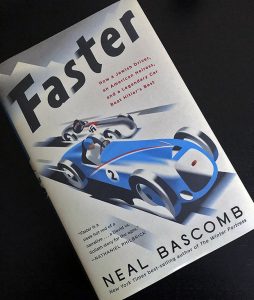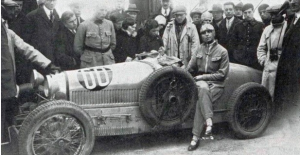By Brian Baker
Vice President, Education
Principal Historian
Lucy O’Reilly Schell was a successful rally racer, the first woman to compete in a Grand Prix race and the first woman to own Grand Prix and Indianapolis 500 racing teams. Just before WWII, Schell, an American heiress living in Paris, set her sights on Grand Prix racing. Hitler had used his anti-Semitic government to fund racing to demonstrate German engineering superiority. The race cars from Mercedes Benz and Auto Union had dominated the Grand Prix series for years. The Germans did not see Schell as a threat, yet the diminutive Jewish multi-millionaire racer proved that they underestimated her. Neal Bascomb’s new book, The Racers, brings this amazing story out of the shadows of history.

Schell and her husband Laury, an American rally driver living in France, were a formidable racing team and shared driving duties for years.
In 1928, Schell won 6th place in the Grand Prix de la Marne and became the first woman to compete in a Grand Prix Race (the equivalent of a Formula One race today). She later turned to rallying and drove to an excellent overall finish in the Monte Carlo rally in 1929.
At the 1934 Paris Auto Salon, Schell used her forceful personality to commission the Delahaye 135 Compétition Spéciale as her own racer. She got her wealthy friends together and ordered a dozen cars. She became Grand Prix racing’s first woman owner by pressing Delahaye into a factory racing team with 12 privateer cars (half of the cars were owned by her).
René Dreyfus was a top talent in Grand Prix racing who was banned from the top teams because of his Jewish heritage. Schell convinced him to join her Grand Prix team, Ecurie Bleue.

The first race of the 1939 Grand Prix season was on the twisted street course of Pau, France. This would be the best chance for Dreyfus, in a new 4.5-liter type 145 Delahaye, to challenge the mighty German empire’s racers. Schell’s French car beat Hitler’s Mercedes team with the swastika displayed on its tail. It was a major blow to the Nazi party.
After the victory over Mercedes at Pau, Laury died in a road accident, but this was not the end of Schell’s passion for motorsports. To avoid Nazi occupation of France, she took her son to the United States and set her sights on the Indianapolis 500.
Unfortunately, confusing rules and mechanical issues doomed Schell’s team (the first woman-owned team) at Indianapolis. Schell lived to see her son Harry become a successful driver in the Formula One series before she passed in 1952.
The Racers tells the untold story of how one person with passion, motivation and a few million dollars, stood up to the Nazi propaganda machine and succeeded.